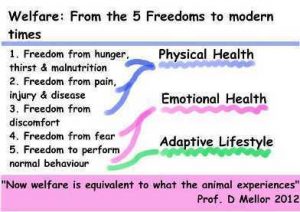Animal Welfare Act 2006

The Animal Welfare Act 2006 contains the general laws relating to animal welfare – it is an offence to cause unnecessary suffering and there is a duty of care to animals (i.e. ensure their needs are met).
The key elements of the Animal Welfare Act 2006 in relation to dogs are to:
Provide a suitable environment / place to live. The dog should have the right environment for its breed – for many, this will be a warm house with bedding (although huskies and some other double-coated dogs may prefer to sleep outside, particularly in the snow!); ideally a garden but at least a place where it can urinate and defecate; walks suitable for his age and breed / size; an environment free of dangers, stress and worry; a place where he can relax and sleep.
Provide a suitable diet. This should be a diet appropriate for a dog, whether kibble, cooked food or raw food. It also includes access to fresh drinking water.
Allow the animal to exhibit normal behaviour patterns. The dog should allowed to be a dog! It should not be caged or confined for any extended period of time, should be treated as part of the family (whilst appreciating that it is a dog, not a baby), should be able to run and play and sniff and just be a dog.
Be protected from pain, injury, suffering and disease. This can include an act or failure to undertake an act, the result of which causes an animal to suffer; undertaking a prohibited procedure (e.g. tail docking by anyone other than a vet, and for cosmetic rather than health reasons), poisoning a dog, and using a dog for animal fighting. Included in here will be the preventatives for parasites, and the requirement to visit a vet should the dog need veterinary assistance.
Anyone who does not provide for a dog’s welfare needs may be banned from owning animals, fined up to £20,000 and/or sent to prison.
